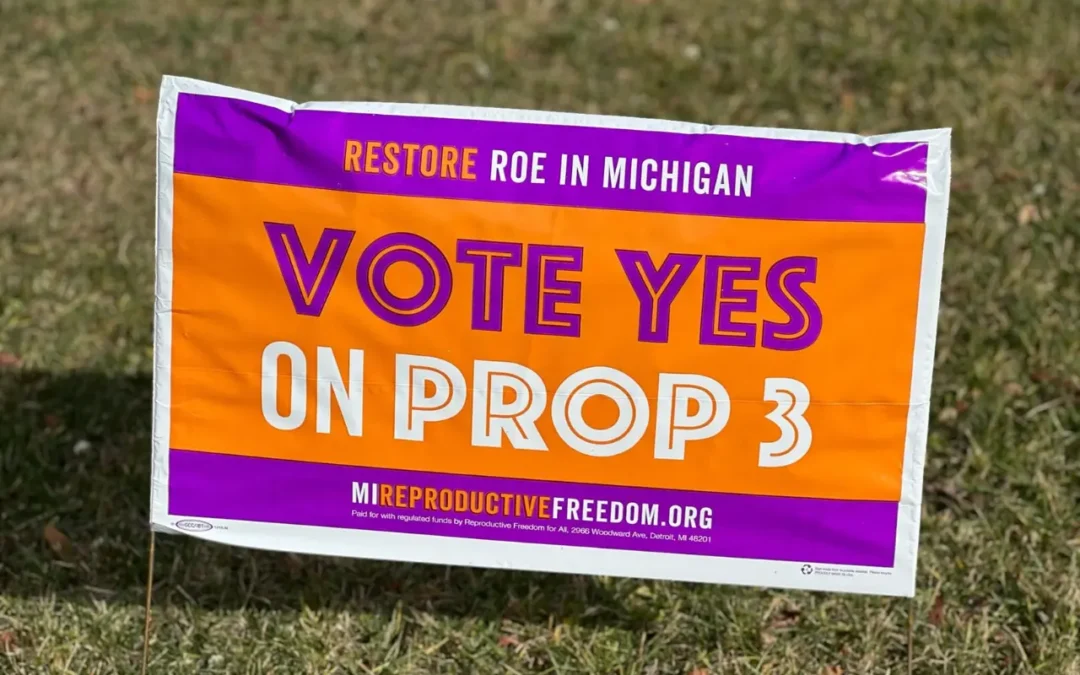
Photo Courtesy of Nikki Sapiro Vinckier
With more than 45,000 followers across her social media accounts, OB-GYN PA-C Nikki Sapiro Vinckier is using her platform to combat misinformation about reproductive health.
You can learn a lot on social media, but it’s not always the right thing.
“Social media is an interesting place for gynecology right now because there is a tremendous amount of misinformation,” said Nikki Vinckier of Birmingham, in a recent interview with The ‘Gander.
Vinckier, 36, is a certified physician assistant who works in obstetrics and gynecology. She said that in her 8 years as an OB-GYN PA-C, she personally saw the impact of misinformation on her patients.
“I would see about 20 patients per day, and, in my day-to-day practice, I would have to spend a lot of time just dispelling a lot of TikTok myths about birth control and contraceptives,” she said.
While social media platforms have become places for many people to share experiences about reproductive health, research has shown that platforms like TikTok, YouTube, and Meta have contributed to the spread of misinformation about women’s health care since the US Supreme Court’s decision to overturn Roe v. Wade in 2022.
This concerns Vinckier, who voted to cement the right to abortion into the state constitution in 2022 and has supported Democratic lawmakers as they repealed several of Michigan’s anti-abortion laws.
Vinckier said she’s especially concerned about how Project 2025—the document Donald Trump’s team released detailing his plans for the presidency, should he win the election in November—would further restrict women’s reproductive rights.
“There’s definitely a lot of literature within Project 2025 that risks us losing access to contraceptives,” said Vinckier. She added that resources like an Intrauterine Device, or an IUD—one of the safest and most effective birth control methods available—may no longer be accessible for most Americans under Project 2025.
“My concern is, with time, if insurance companies will no longer be mandated to cover contraceptive care, you’re looking at things like an IUD—which is a $1,200 to $1,400 device—being out of reach for a tremendous amount of Americans,” she said.
In 2017, a leaked regulation from then-President Trump’s administration revealed a plan to overhaul the birth control mandate of the Affordable Care Act (ACA), which requires nearly all employers to offer health insurance that covers access to a wide array of contraceptive methods.
If the regulation had become law, the cost of contraceptives, as Vinckier feared, would have skyrocketed.
Today, as Trump again runs for the highest office in the country, his team’s Project 2025 echoes similar threats. What’s more, the conservative-majority US Supreme Court has opened a pathway to revoking rights to contraceptives on a national level, should a case come before them.
Wanting to be a voice for her patients and others, Vinckier began posting accurate, accessible information regarding reproductive health care to her own social media—and it has changed the trajectory of her life as an advocate.
Bringing it to the yard
Earlier this summer, after President Joe Biden exited the presidential race and endorsed Vice President Kamala Harris as the Democratic Party’s 2024 nominee, Vinckier said that she and other reproductive rights advocates felt a change in the air.
“Kamala Harris was the first sitting vice president to ever visit an abortion clinic—she’s far more outspoken in her support of reproductive rights,” said Vinckier, referencing Harris’ March 14 visit to a Planned Parenthood clinic in Minnesota, which was the first time a US president or vice president had ever made an official stop at an abortion care practice.
As soon as Vice President Harris was endorsed, Vinckier looked for a campaign sign online. Not finding any, she quickly designed one herself and had it printed at a CVS near her home. That evening, Vinckier displayed the sign—which said “All In, Let’s Go Kamala Harris” on a hot pink background—on her front lawn.
“I had a couple of friends who were interested in it as well, so I ordered 25 more,” she said. Vinckier set up the signs on her front lawn, allowing people to take a sign and leave money that would be donated to Harris’ campaign fund.
“Then I had a little tiff with a neighbor, which then launched this whole social media frenzy.”
Her neighbor had dropped off a folder containing printed pages detailing the City of Birmingham’s Sign Ordinance, which limits yard signs to one sign per home for 90 days at a time. However, there was nothing in the ordinance about signs left out for others to pick up. Neither was there anything in the ordinance specifying the maximum size of a special event sign.
That’s when Vinckier got creative. She ordered 200 more signs, put them in her front yard, and tied a string around each one, connecting them—technically making them one large sign. She then posted a video about it online.
Since then, Vinckier’s videos chronicling her sign campaign have received millions of views on social media. She was interviewed by local and national news outlets about her increasingly popular #KamaLAWN signs, and recruited Michiganders in all corners of both peninsulas to help pass out yard signs.
“I felt more emboldened and empowered by this concept that one person can make a difference,” said Vinckier.
After a huge number of people reached out to cheer her on, Vinckier said she realized she could help in other ways, too—like combating misinformation around women’s health. She began posting about her work in reproductive health care on social media, along with ways that patients could advocate for themselves at the doctor.
From explaining the importance of IUDs to sharing voter registration resources, Vinckier used her platform to help dispel the types of conspiracy theories and lies she heard from her worried patients.
“Michiganders, listen up. I want to chat a little bit about the Right to Life group,” begins one video, in which Vinckier breaks down the special interests of the Right to Life organization.
“I’m here to chat with you about some contraceptive options,” she says in another video. “Back in 2016 after Donald Trump won the election, I inserted a tremendous amount more IUDs between November when he was elected and January when he took office. So I figured I would kind of just be a little more preemptive…so you know what your options are.”
Vinckier has posted videos in which she interviews Michigan Attorney General Dana Nessel, and Lieutenant Governor Garlin Gilchrist where she talks about what it meant to her as a reproductive health care provider to hear Vice President Kamala Harris talk about abortion as a “normal thing.”
“We spend so much time talking about the fetal anomaly cases, some of the maternal health cases because as you can imagine, those are the cases that can really swing those middle voters,” she says. “But one of the things that’s also important to talk about is those who seek abortion care simply because they don’t want to be pregnant—and that’s okay, too.”
Not everyone in Vinckier’s life shared the excitement of her increasingly interested audience. In a termination letter sent to her by her employer in early September, Vinckier’s employer wrote that she was “no longer a professional fit” for their clinic.
“I loved practicing clinical medicine. I’ve built up such an incredible network of patients over the last eight years, and it was really hard to leave that,” said Vinckier.
After posting about her termination, some of her former patients began sharing stories about how she impacted their lives—many of them noting how comfortable she made them feel during times of worry and vulnerability.
Seeing these comments inspired Vinckier to double down on her advocacy work—and she hasn’t stepped off the gas pedal since.
Today, Vinckier has sent out more than 12,000 of her #KamaLAWN signs. She has also had opportunities to speak about reproductive rights with Michigan’s state leaders and has been invited to several Harris-Walz campaign events, including the Reproductive Freedom bus tour.
In a recent Instagram Live interview with Shannon Watts, the founder of gun violence prevention group Moms Demand Action, Vinckier said that she wants more people to lean into what motivates them, even if it’s uncomfortable.
“I didn’t start this whole thing with this end goal in sight—it just happened and grew,” said Vinckier.
“I think when we trust ourselves and when we trust our intuition…We have this ability to grow something organically together.”
Support Our Cause
Thank you for taking the time to read our work. Before you go, we hope you'll consider supporting our values-driven journalism, which has always strived to make clear what's really at stake for Michiganders and our future.
Since day one, our goal here at The 'Gander has always been to empower people across the state with fact-based news and information. We believe that when people are armed with knowledge about what's happening in their local, state, and federal governments—including who is working on their behalf and who is actively trying to block efforts aimed at improving the daily lives of Michigan families—they will be inspired to become civically engaged.


Wakefield doula helping local moms as federal funding cuts impact the Upper Peninsula
As federal funding cuts cause more rural hospitals in the Upper Peninsula to close their doors, doulas like Lynnea Laessig of Wakefield are stepping...

Right to Life of Michigan files court appeal to challenge Proposal 3 claiming ‘dangerous overreach’
BY KATHERINE DAILEY, MICHIGAN ADVANCE MICHIGAN—Right to Life of Michigan, alongside several parents, have filed an appeal in the US Court of Appeals...

These two southeast Michigan moms want to fight for their communities—so they’re running for office
As Republican lawmakers try to cut maternal health care resources in Michigan and beyond, these ‘Ganders are pushing back—by trying to replace...

This Detroit community is helping its neighbors recover with abortion after care event
“At the end of the day, it’s going to be a community that pours into one another, especially when things get hard.” As attacks on abortion and...

Planned Parenthood extends telehealth to 7 days a week in Michigan due to growing demand
“For many of our patients, telehealth is literally lifesaving.” In response to the escalating attacks on sexual and reproductive health care...





